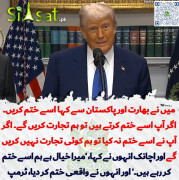RajaRawal111
Prime Minister (20k+ posts)

Few days ago there a Huge orchestra playing lots of trumpets on Pakistan Ranking on Ease of doing business. And I was thinking that it is yet nothing more than pencil pushing. What the hack are these Monkeys are dancing for ???
But it was one opportunity for IMAGE STARVING IMRAN KHAN. So obviously a Band had to play the Trumpets. Even if it meant nothing.
Here is and article from a PhD teaching economics in various universities. It speaks quite a bit about it.
Article starts from here on
The World Bank’s latest rankings of 190 countries on the Ease of Doing Business (EDB) is out. Pakistan did well, considering it moved up 28 rungs on the rankings ladder, from 136th place to 108th. In this latest round, Pakistan is one of 10 countries (Saudi Arabia, Jordan, Togo, Bahrain, Tajikistan, Kuwait, China, India, and Nigeria) that have improved the most across at least three of the 10 factors that go into constructing the EDB rankings. The annual report received wide publicity on its arrival because the rankings matter. They reflect how conducive the regulatory environment is for opening a business, getting a location, accessing finance, dealing with day-to-day operations, and operating in a secure business environment. They also enable both intra-country and inter-country comparisons. They show not only how a country has fared over the years but also where it stacks up in relation to others. The rankings, therefore, are useful not only for domestic policy makers who find out how successful they were in improving the regulatory environment, but also for business executives who need to make decisions about which countries to enter for investment and business expansion.
Businesses look at rankings to make sense of the regulatory environment. Thus, if a country’s ranking is high, the likelihood of being included as a candidate for further review is greater. On the other hand, if the rank is low, decision makers may not even look its way. In this regard, the rankings may serve the purpose of a travel advisory. If a travel advisory is in effect for a country, one would refrain from going there; but if one does need to go there, extra precautions would be warranted.
But then, should low-ranking countries assume they will receive less investments than higher ranked countries? Not necessarily. Much more goes into foreign direct investment (FDI) decisions than simply the EDB ranking. To link the ranks of countries with the flow of investments would be stretching the purpose of the report. The rankings do not suggest that the country at the top will receive the highest amount of investments or, for that matter, the country at the bottom will receive the lowest.
Furthermore, will an improvement in ranking lead to higher investments? Here the evidence is not unequivocal. Bangladesh, for example, is ranked below Pakistan, yet the inflow of foreign direct investments, on a per capita basis, is greater there than in this country. The same is the case with Egypt, and Brazil is another glaring example of how a lower rank does not deter the inflow of FDI. An improved ranking helps, but it will not necessarily lead to higher investments.
Should policy makers worry about improving the country’s ranking? Yes. The examples above merely show that there is no one-to-one correspondence between rankings and the inflow of investments. There are naturally several other factors, besides the EDB ranking, that businesses consider when making investment decisions.
Keeping this in mind, what is Pakistan to do? Although the country has improved its overall standing and placed itself in the 108th position, its ranking, not surprisingly, is dismally low on several factors. For example, for the factor of paying taxes, which looks at payment time, tax and contribution rate, its ranking is 161. For enforcing contracts, which looks at time and cost to resolve a commercial dispute and quality of the judicial process, its ranking is 156. For registering property, which looks at procedures, time and cost to transfer property, its ranking is 151.
However, with the new and improved ranking, Pakistan can say that it is ready for business. The question remains, what does Pakistan bring to the table? Or more relevantly, what is its value proposition? What does it do better than others that would help businesses achieve their competitive advantage?
As Pakistan considers the answers to these questions, there are three essential things it must put into place to move forward. All three are a work in progress, but they need to stay on the front burner. First, Pakistan needs to improve transparency. Transparency is the antidote to corruption and what happens under the table should be brought into the shining glare of the light. Second, Pakistan needs to focus on putting different steps of the investment application and approval process online, providing potential investors relevant facts, figures, and forms. This will help streamline the process. Thirdly, the state needs to decentralise decision making and everything should not be controlled at the federal level. There is an economic cost to this centralised approach. For the overall benefit of the country, provinces and cities should be allowed to make decisions and compete for foreign investments. Therefore, an improvement in the EDB rankings does not mean that our economic situation is destined to improve, which is why it important that we continuously work towards bettering our economy.
Dr Syed Akhter

The author is Professor Emeritus of Marketing at Marquette University in Milwaukee, Wisconsin, USA, and a Fulbright scholar. He has published extensively in business and marketing journals and has taught graduate and undergraduate level courses in North America, Europe, South America, and Asia.

What does Pakistan’s improved ‘Ease of Doing Business’ ranking mean? | The Express Tribune
Although the country has improved its overall standing, its ranking is still dismally low on several factors






























